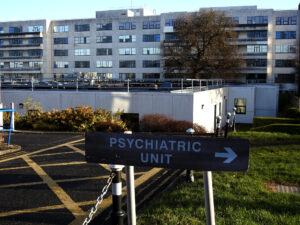
Sign for psychiatric unit of hospital.
When major mental health struggles require immediate attention, terms like “mental hospital” and “psych ward” may come up, especially for people unfamiliar with the different therapeutic modalities available. You’ve probably seen these settings dramatized in movies or TV shows, but what do they actually involve? And how can they help those in need?
Understanding the differences between a mental hospital and a psych ward can make it easier to decide where to seek care for yourself or a loved one.
What Is a Mental Hospital?
A psychiatric hospital, commonly referred to as a mental hospital, is a dedicated facility designed for the treatment of severe and persistent mental health conditions. These facilities should be licensed by the California State Department of Health Care Services and provide structured, long-term care for individuals whose symptoms require intensive medical and psychological intervention.
Unlike short-term crisis centers, mental hospitals focus on stabilization, rehabilitation, and treatment of complex psychiatric disorders. Depending on their needs, patients may stay for weeks, months, or even longer.
Some individuals enter voluntarily, seeking specialized care they cannot get in an outpatient setting. Others are admitted involuntarily due to concerns about safety or the inability to manage daily life due to their condition.
Who Needs Care at a Mental Hospital?
Psychiatric hospitals typically serve individuals with severe mental health conditions that require continuous medical oversight and therapeutic intervention.
Common Reasons for Admission into a Mental Hospital:
- Medication Adjustments: Conditions like schizophrenia, bipolar disorder, and major depressive disorder often require precise medication management, which can be difficult to achieve in an outpatient setting.
- Stabilization for Acute Psychiatric Episodes: Severe panic attacks, psychosis, or suicidal ideation often necessitate inpatient care to ensure immediate safety.
- Long-Term Rehabilitation: Individuals with chronic mental illness who struggle with independent living may receive extended treatment to develop coping strategies and regain stability.
Mental hospitals provide structured care for those facing severe mental health challenges—offering stability when life feels unmanageable.
Key Features of Mental Hospitals
Mental hospitals operate with 24/7 medical supervision and a multidisciplinary approach to treatment.
What Patients Can Expect:
- Inpatient psychiatric care with access to psychiatrists, therapists, and nursing staff.
- Trauma-focused therapy for individuals dealing with PTSD, past abuse, or trauma from childhood.
- Dual-diagnosis care addressing both mental illness and co-occurring substance use disorders.
- Specialize in medication management, psychiatric evaluations, and crisis intervention.
Some psychiatric hospitals operate as state hospitals, focusing on long-term treatment for individuals with severe mental illness (SMI). Others function as private mental health clinics, offering specialized care with shorter treatment durations.
What Is a Psych Ward?
A psych ward, or psychiatric ward, is a unit within a general hospital or medical facility that provides short-term, crisis-focused care. These units are designed to stabilize patients experiencing acute mental health emergencies before transitioning them to longer-term treatment options.
Unlike psychiatric hospitals, which provide long-term psychiatric care, psychiatric wards focus on immediate safety and stabilization. Patients typically stay for a few days to a several weeks before being discharged or transferred to a more structured program.
Who Needs Psych Ward Care?
Psych wards are often the first point of contact for individuals in a mental health crisis.
Common Reasons for Admission:
- Crisis stabilization for individuals experiencing suicidal thoughts or self-harm.
- Management of acute psychiatric symptoms, such as severe anxiety, psychosis, or mania.
- Short-term medical monitoring after a mental health-related emergency, such as an overdose or psychiatric break.
These facilities operate with a high level of security to ensure patient safety, often featuring locked wards to prevent self-harm or elopement.
What Happens in a Psych Ward?
The primary goal of a psych ward is rapid stabilization. Once a patient is admitted, they undergo an initial psychiatric evaluation to determine the best course of action.
What Patients Can Expect:
- Medication management to help stabilize acute symptoms.
- Brief individual or group therapy sessions to assess ongoing treatment needs.
- Coordination with outpatient programs, such as Intensive Outpatient Programs (IOP) or Partial Hospitalization Programs (PHP), for continued care after discharge.
Psych wards do not provide long-term therapy or rehabilitation but serve as a bridge to further treatment.
Psych Wards vs. Mental Hospitals: Key Differences
Both settings provide inpatient psychiatric care, but their goals and treatment approaches differ.
Psych Wards:
- Short-term, emergency-focused care.
- Stabilizes patients experiencing immediate psychiatric crises.
- Prepares individuals for outpatient mental health treatment or longer-term care.
Mental Hospitals:
- Long-term inpatient care for severe mental illness.
- Provides structured programs for trauma, schizophrenia, and bipolar disorder.
- Focuses on rehabilitation, therapy, and ongoing medication management.
Think of a psych ward as the ER of mental health care—short-term but crucial.
The Role of IOP in Bridging the Gap
Not everyone who struggles with their mental health needs full hospitalization. Some people leave a psych ward stabilized but still need ongoing care. Others recognize they need structured support but want to avoid inpatient treatment altogether.
That’s where Intensive Outpatient Programs (IOPs) come in.
What Is an IOP?
An Intensive Outpatient Program for mental health offers a structured treatment approach without requiring a hospital stay. It’s designed for individuals who need more than weekly therapy but less than 24/7 inpatient care.
Key Benefits of IOPs
- Flexibility: Patients receive structured care while continuing daily responsibilities.
- Comprehensive Support: Combines individual therapy, group sessions, and skill-building.
- Step-Down from Inpatient Care: Helps individuals transition from hospitalization to everyday life.
IOP bridges the gap—offering intensive care without disrupting life.
Who Benefits from an IOP?
IOP is an option for people who:
- Have recently been discharged from a psych ward and need continued support.
- Struggle with severe anxiety, depression, or trauma but don’t require inpatient psychiatric care.
- Need consistent therapy to prevent symptoms from escalating into a crisis.
It’s a structured middle ground, offering stability without needing hospitalization.
How IOPs Support Long-Term Recovery
Unlike inpatient care, which is focused on immediate stabilization, IOPs help individuals develop long-term coping strategies.
What IOP Treatment Typically Includes:
- Behavioral therapy programs that address thought patterns and emotional regulation.
- Medication management to adjust or maintain psychiatric prescriptions.
- Group therapy sessions that provide peer support and shared learning.
For many, IOP is the missing piece—providing the care needed to heal while maintaining independence.
When to Consider IOP Instead of Inpatient Care
Inpatient treatment may be necessary if someone is an immediate danger to themselves or others. However, IOP can be a better fit for those who need intensive support without hospitalization.
Not every crisis requires hospitalization. Sometimes, what’s needed is structured support that fits into daily life.
Redeemed Mental Health in Newport Beach provides compassionate, trauma-informed care through IOPs designed for individuals facing major mental illnesses and past trauma.
Some mental health conditions can’t be managed alone—and waiting too long can make symptoms harder to treat.
When to Consider Inpatient Psychiatric Care (Psych Ward or Mental Hospital)
- Persistent thoughts of self-harm or harm to others.
- Hallucinations, paranoia, or extreme mood swings.
- Suicidal ideation or attempts.
- Severe withdrawal from loved ones and daily activities.
Psychiatric hospitalization provides immediate safety and stabilization in these situations.
When Outpatient Care or IOP May Be Enough
Not every mental health struggle requires hospitalization. Some individuals need consistent treatment but can manage symptoms with support from outpatient care.
Consider an Intensive Outpatient Program (IOP) if:
- Anxiety, depression, or trauma-related symptoms worsen despite therapy or medication.
- Daily responsibilities feel overwhelming, but inpatient treatment feels unnecessary.
- A pattern of relapsing symptoms interferes with work, relationships, or self-care.
Seeking help early can prevent a crisis and make recovery more manageable.
Finding the Psychiatric Care for your Mental Health
If symptoms are escalating, professional help is the next step. Whether it’s an inpatient stay for crisis stabilization or an IOP for long-term support, getting help before things spiral can lead to better outcomes.
Redeemed Mental Health in Newport Beach provides trauma-informed mental health care for individuals struggling with major mental illnesses. If you or a loved one needs support, reach out today to discuss in-person and online treatment options.
The right treatment depends on the situation. Some individuals need crisis stabilization in a psychiatric hospital or psych ward. Others benefit from structured outpatient care that provides long-term tools for managing mental health conditions.
Compassionate Support at Redeemed Mental Health
No two mental health journeys look the same. Whether facing major mental illness, trauma, or ongoing struggles with anxiety and depression, finding a treatment plan that fits your life is key.
Redeemed Mental Health in Newport Beach offers trauma-focused, evidence-based care in an Intensive Outpatient Program (IOP) designed to help individuals regain balance without requiring hospitalization. If you or a loved one needs support, contact Redeemed Mental Health today to explore treatment options and take the next step toward healing.
You don’t have to go through this alone—help is here when you’re ready.























